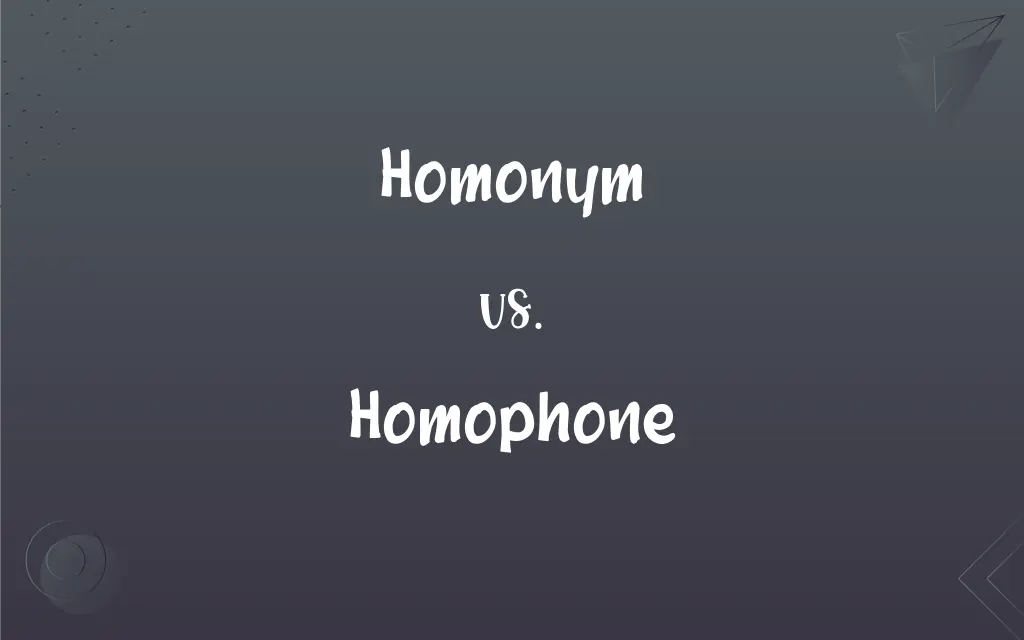Homonym vs. Homophone: What's the Difference?
Edited by Aimie Carlson || By Harlon Moss || Published on January 17, 2024
Homonym are words with the same spelling or pronunciation but different meanings. Homophone are words with the same pronunciation but different meanings and usually different spellings.

Key Differences
Homonyms are words that are spelled and pronounced the same but have different meanings, such as "bank" (river bank) and "bank" (financial institution). Homophones, on the other hand, are words that are pronounced the same but have different meanings and usually different spellings, like "to," "two," and "too."
Homonyms can be divided into two types: homographs (same spelling, different pronunciation, e.g., "lead" the metal and "lead" to guide) and homophones. This highlights that all homophones are homonyms, but not all homonyms are homophones. In contrast, homophones always have the same pronunciation but differ in spelling and meaning, such as "flour" and "flower."
Homonyms often arise due to the evolution of language where one word comes to have multiple meanings. An example is "bat," which can mean a flying mammal or a piece of sports equipment. Homophones, however, often result from phonetic similarities and can cross word classes, like "knight" (noun) and "night" (noun).
In learning languages, homonyms can be challenging because they require understanding of context to discern meaning. For instance, "right" can mean correct or a direction. Homophones require attention to spelling and grammar, as in "their" (possessive), "there" (location), and "they’re" (contraction for they are).
Homonyms are widely used in wordplay and puns because of their multiple meanings within the same spelling or pronunciation. Homophones, due to their sound similarity, are commonly used in rhymes and poetry, creating a phonetic harmony, as seen with "sea" and "see."
ADVERTISEMENT
Comparison Chart
Pronunciation
Can be identical or different
Always identical
Spelling
Usually identical
Usually different
Meaning
Different
Different
Types
Includes homographs and homophones
-
Language Learning Focus
Contextual understanding
Spelling and grammatical accuracy
ADVERTISEMENT
Homonym and Homophone Definitions
Homonym
A word identical in form to another but different in meaning.
I love reading books in the library's reading room.
Homophone
Phonetically identical words, different in meaning and spelling.
He could not bear to bare his feelings.
Homonym
Identically spelled or pronounced words with distinct meanings.
He had to bow to the audience after tying the bow.
Homophone
Same-sounding words, distinct in spelling and meaning.
The sea is as blue as I see it.
Homonym
Words that share spelling and pronunciation but differ in meaning.
She can't bear the weight of the bear statue.
Homophone
Words that sound the same but have different meanings and spellings.
Write the right answer on the board.
Homonym
Words alike in spelling/pronunciation but not in meaning.
The wind was too strong to wind the kite.
Homophone
Words with identical pronunciation but differing in spelling/meaning.
They're going over there to get their coats.
Homonym
Words that sound/look the same but have different meanings.
The band was excited to play in the band.
Homophone
Words sounding the same, differing in spelling and meaning.
I need to buy a new bike, by tomorrow.
Homonym
One of two or more words that have the same sound and often the same spelling but differ in meaning, such as bank (embankment) and bank (place where money is kept).
Homophone
One of two or more words, such as night and knight, that are pronounced the same but differ in meaning, origin, and sometimes spelling.
Homonym
A word used to designate several different things.
Homophone
(semantics) A word which is pronounced the same as another word but differs in spelling or meaning or origin.
Homonym
A namesake.
Homophone
A letter or group of letters which are pronounced the same as another letter or group of letters.
Homonym
(Biology) A taxonomic name identical to one previously applied to a different species or other taxon and therefore unacceptable in its new use.
Homophone
A letter or character which expresses a like sound with another.
Homonym
A word that both sounds and is spelled the same as another word.
Homophone
A word having the same sound as another, but differing from it in meaning and usually in spelling; as, all and awl; bare and bear; rite, write, right, and wright.
Homonym
(loosely) A word that sounds or is spelled the same as another word (but not necessarily both), technically called a homophone (same sound, different spelling) or a homograph (same spelling, different sound), or if both are the same, a homonym.
Homophone
Two words are homophones if they are pronounced the same way but differ in meaning or spelling or both (e.g. bare and bear)
Homonym
(taxonomy) A name for a taxon that is identical in spelling to another name that belongs to a different taxon.
Homonym
A word having the same sound as another, but differing from it in meaning; as the noun bear and the verb bear.
Homonym
Two words are homonyms if they are pronounced or spelled the same way but have different meanings
FAQs
What are examples of homophones?
"Son" and "sun," "flower" and "flour."
Can a homonym be a homograph and homophone at the same time?
Yes, like "bat" (animal or sports equipment).
Are homophones always spelled differently?
Typically, but there are exceptions like "lead" (to guide) and "lead" (the metal).
Do homophones contribute to puns and wordplay?
Yes, they're often used in puns for humorous or poetic effects.
What is a homonym?
A word that is spelled and/or pronounced like another word but has a different meaning.
How do homonyms occur in language?
Through linguistic evolution where a word acquires multiple meanings.
Can homonyms lead to misunderstandings?
Yes, especially if the context is not clear.
Why are homophones challenging in language learning?
They require understanding of spelling and context due to identical pronunciation.
Can homonyms be different parts of speech?
Yes, like "match" (noun) and "match" (verb).
Are all homonyms also homographs?
No, only those that share the same spelling.
Is understanding homonyms important for language proficiency?
Yes, it aids in comprehension and accurate usage.
Are homophones always nouns?
No, they can be any part of speech.
How do homophones affect reading comprehension?
They require careful attention to context for understanding.
Can homonyms be used for encryption or secret languages?
Yes, they can create codes or playful language games.
What role do homonyms play in poetry?
They add layers of meaning and complexity.
Do homonyms enhance linguistic creativity?
Yes, they're a tool for creative expression in language.
How are homophones used in advertising and branding?
For catchy, memorable phrases or wordplay.
How can one distinguish between homophones in speech?
Through context and sentence structure.
Do homophones occur in all languages?
Most languages have homophones, but their frequency varies.
Are homophones and homonyms unique to English?
No, they are found in many languages.
About Author
Written by
Harlon MossHarlon is a seasoned quality moderator and accomplished content writer for Difference Wiki. An alumnus of the prestigious University of California, he earned his degree in Computer Science. Leveraging his academic background, Harlon brings a meticulous and informed perspective to his work, ensuring content accuracy and excellence.
Edited by
Aimie CarlsonAimie Carlson, holding a master's degree in English literature, is a fervent English language enthusiast. She lends her writing talents to Difference Wiki, a prominent website that specializes in comparisons, offering readers insightful analyses that both captivate and inform.







































































